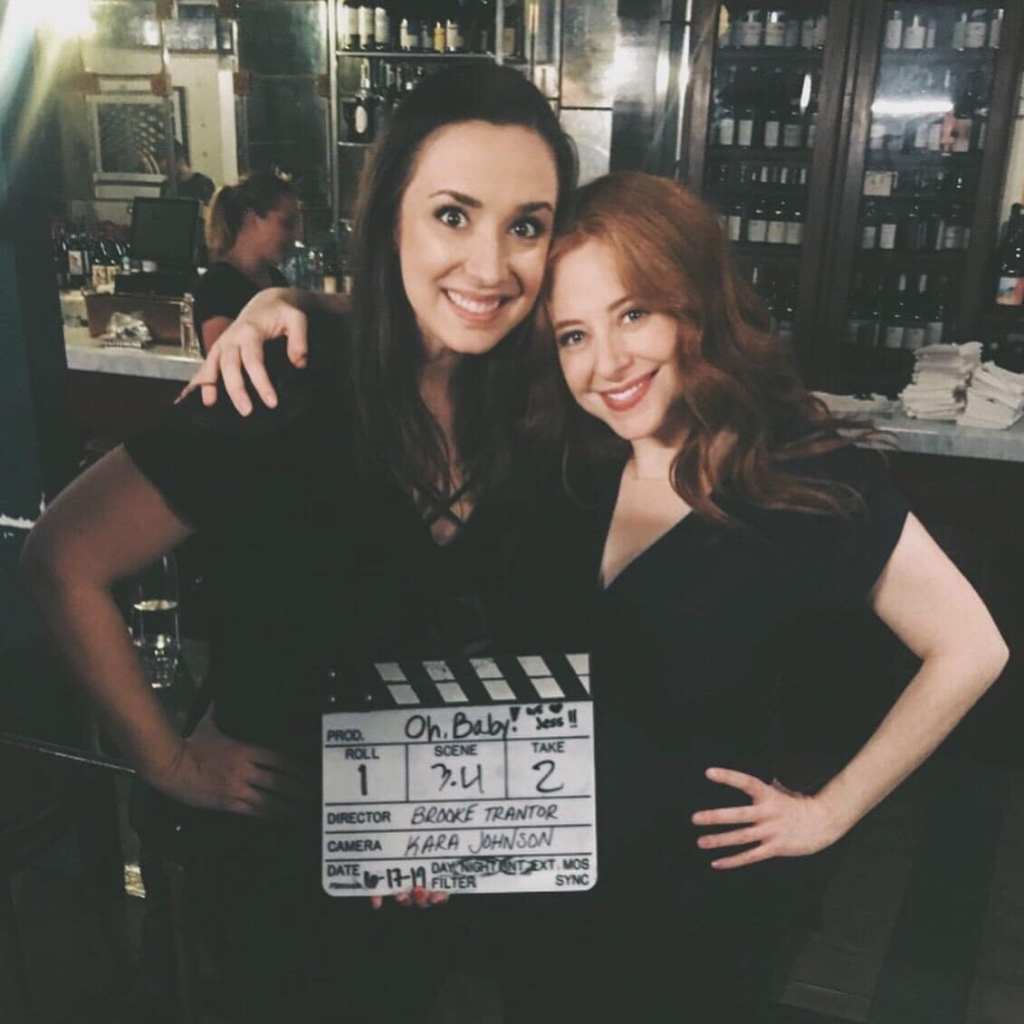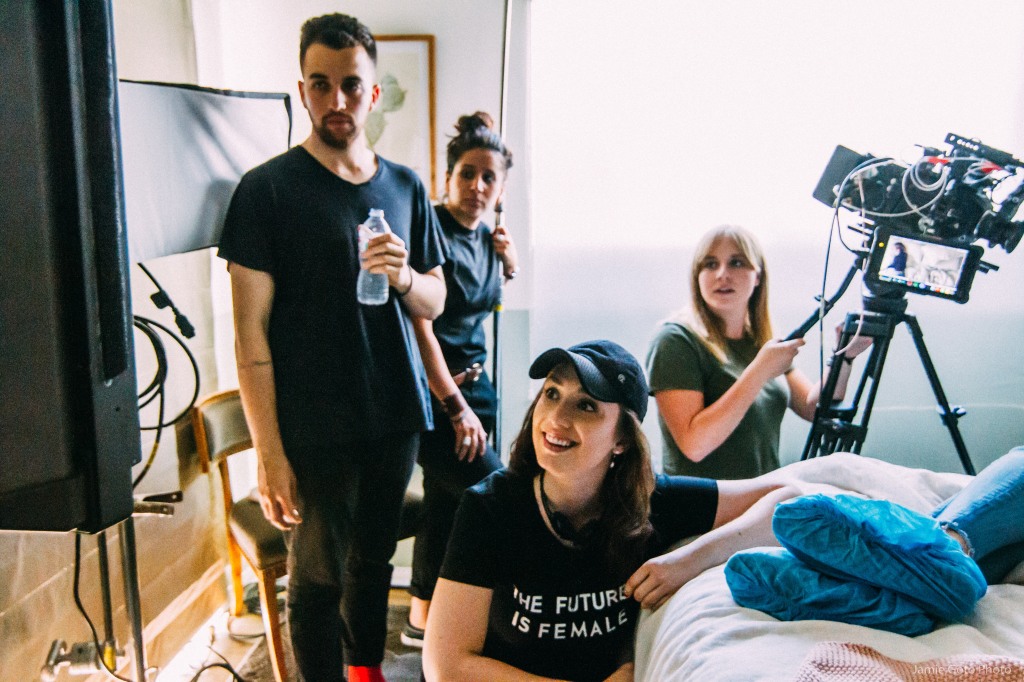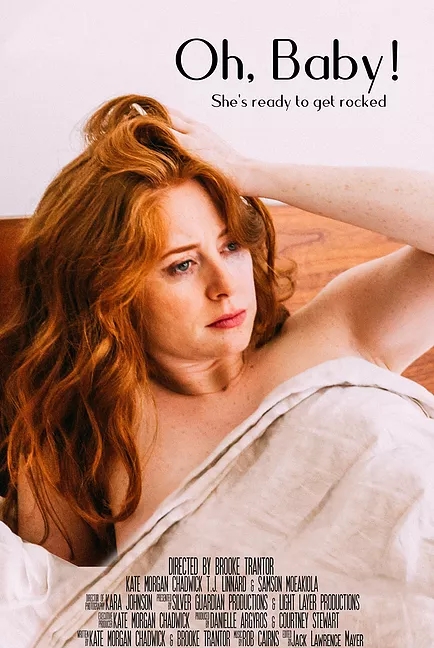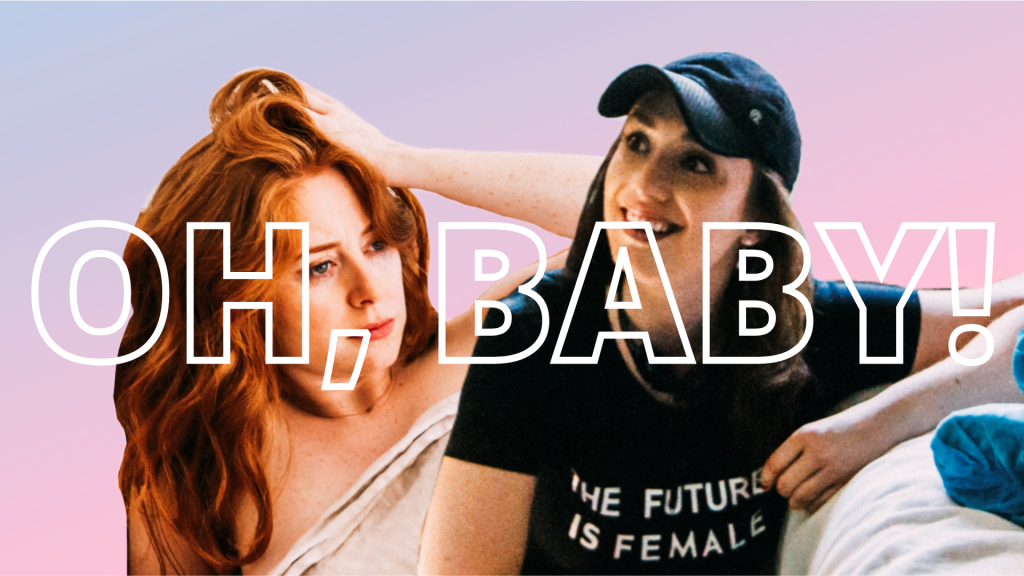Written by Malin Evita
For whichever reason, pregnant women are rarely ever shown in the media with an ounce of sexuality within them. Could this be because of the ever prevailing male gaze with its entitlement to the female body? Could it be that women who are mothers are often perceived as solely the latter—yet again viewed as a person solely existing for someone else and never themselves? Or perhaps it’s subconscious influence from the story of the holy Virgin Mary and prevalent purity culture?
Filmmaker duo Brooke Trantor (writer-director) and Kate Morgan Chadwick (writer-actress) touch on all of this and more in their new short film Oh, Baby! The comedy, which is about to enter its festival circuit, follows the highly pregnant Jane (Chadwick), who’s desperate for a good lay from her date Ben (TJ Linnard), and all that comes along with this unseen experience. Determined to embrace the female gaze and tell the unheard stories of women in our society, Brooke and Kate sat down with me to talk all about the creative process behind their brilliantly witty and sharp film, female sexuality, and breaking free from tropes and societal expectations.
*This interview has been slightly edited and condensed.

ME: Pun fully intended – how was this concept first conceived?
KMC: I think you just answered your own question! It’s like, sex happened. Unprotected sex with my husband and I had been trying, and I actually—I didn’t mention it to the other men we’ve interviewed with, but because you are a woman, I just feel more comfortable saying this, but I did have a miscarriage. And there was a lot of grieving after that and a lot of, man, what’s life?
I had a beautiful experience working on Brooke’s film between my miscarriage and conceiving my son Cal, my two-year-old son now, and I just felt this shift in the energy of what it’s like to create when you’re in a not-good place—and then when I did get pregnant, that sort of sadness and confusion shifted to hopefulness. Let’s make something during the time in a woman’s life when – especially in our industry—you’re kind of [side-lined] while you’re pregnant. You know, oh cool, we’ll see you after the baby, have a nice delivery. Enjoy! I just didn’t wanna do that and Brooke didn’t want me to do that and honestly, it was like, let’s be bold and let’s use this fear—because I was scared! Everyone is like, oh, wow! That must be a really brave person!
Uh, no. You can still be scared and do things that scare you because you want to. Because you need to. And so, honestly, that’s where this all sort of came from.
ME: Sex and pregnancy are both separately pretty taboo, even more so when put together. It’s not something you ever really see. Was that something that also pushed you to write this story?
BT: Absolutely. I think our goal was just, how do we continue to celebrate the female narrative? How do we tell these stories to uplift others who aren’t seen? And then Kate got pregnant, and we did research, and it was like, OK, what other projects out there are like this? We want to explore our brash sexual nature, coming from a pregnant perspective.
There was one example, Judd Apatow’s Knocked Up—great example of that. But, the thing was, it’s always from the male perspective. She comes into his life. She’s in his crazy stoner apartment with his friends. Like, no no no—let’s flip it. This is on her terms. She’s asking for what she needs and desires. Let’s bring the man into her world. And that was really important to us once we realised there wasn’t a lot of this story being told really anywhere.
KMC: And we have all of these ideas as women of how to feel and be when pregnant, and there’s a lot of imagery that just rings false to me. Because you can want to have a baby and have those nine months be really not fun. And not just the physicality of being pregnant—I don’t mean being big or being nauseous. I mean that your whole life is shifting, and sometimes you don’t want it to shift. You’re like, well, I want to have a baby, but I don’t want to lose this.
And with Jane, our main character, we wanted to capture—even in our short, ten minutes—that this wasn’t your typical mom. We kind of get the idea that she’s gonna be good at this, whether she knows it or not – the audience knows. And I love that. I think we captured a really unique person who is sort of skewing our idea of what it means to be a mom.
ME: What were people’s initial reactions when you began developing this?
BT: We made it a priority when we started writing together that we were gonna form a team of as many women as we could. We were just like, let’s surround ourselves with as much female energy as we can because we know that’s what’s gonna be supportive. But then the coolest part was then bringing TJ [Linnard] and Samson [Moeakiola] into the cast, and my first AC—all of these guys that were like, we love this! And not from a sexual like, I love the sex scenes, just like, this is a badass script – we wanna be a part of it. It has been really cool to see men react quite positively to the character as well.
ME: Kate, how have you experienced the reception so far – especially considering you’re in the lead and very much portraying the whole story?
KMC: I got a little bit mad at my mom the other day; she alluded to the “risque” factor, and I was like, you know, mom? I’m thirty-eight, and I’ve been doing this for a long time, and there has been other stuff I’ve done that I would find more risky!
[The film] really touches on people’s soft spots and sweet spots. Like, what are you okay with? What are you not okay with? What makes you cringe? What makes you uncomfortable? Why does it make you uncomfortable? And so I kind of had to snap at my mom, and I was like, mom, this is what I do. And she was like, no! I love it! I think—she always uses the word brave—I think you’re so brave.
Mmm, mom, I’m not on the frontlines fighting covid, I’m not curing cancer, I’m not in Afghanistan. I’m not brave; I’m actually operating from a huge place of fear and transforming it into art with my people because that’s all we can do with it, really.
ME: It’s interesting because the male gaze obviously influences everything. And pregnancy is a result of sex, yet pregnant women aren’t really allowed to be in touch with that sexuality. I’m sure some people think this film is inappropriate, but like, it’s a product of sex. It makes no sense.
KMC: But look where we come from: The Bible, Virgin Mary. I mean, our god was made by someone who “didn’t have sex.” So I think putting that seed in people’s minds, the don’t forget, she gave birth to God, but she didn’t have sex. That’s somewhat ingrained in a lot of people. I’m actually just thinking of that, which is fucked up.
BT: Yeah, I think it’s just always been about control and power. I think that’s why this is so important. Because, yes, when a woman becomes pregnant, it’s a new chapter in her life—there’s evolution, there’s growth. But it’s not like, goodbye me-that, and now I am this!
ME: Obviously, this is a movie about sex. And there’s some semi-nudity in it. Was there anything in particular that you took into consideration when directing the sex scene, Brooke?
BT: Oh, absolutely. First and foremost, through the whole process, as a friend outside of being a director, my number one priority was to keep Kate safe and in high spirit, in a very confident place. So with that particular scene—because of my background in improv and my confidence in that realm—in the script, if you read it, it just says “Interior: Bedroom. Sex montage.” We did not write anything.
KMC: Well, we didn’t write anything for that because, honestly, we didn’t know what was gonna happen in that! Because we knew that we were gonna experiment with that.

BT: So that involved me getting on the same page as Kate and TJ and making sure that [the set] was gonna be a safe place. That included creating a close-set, and I just had to tell my producers, I need you outside. I did pull in Danielle [Argyros, co-producer] so she could help me choreograph. Then it was a conversation with my DP and first AC. And it was literally like, I’m gonna have my hands on your shoulders, and just move with me. Just trust. They did, and I was so grateful for that trust because we wouldn’t have been able to capture that without it from everyone.
Just like I would do at an improv show, I would just throw out suggestions. Try this position, try that position. Just improvise dialogue—if you’re uncomfortable, state that! If you’re having a great time, say that! I just wanted them to feel free. They knew what was happening in the scene, they knew the purpose of this scene within the story, so I trusted them, and that’s some of the most fun I’ve ever had on set.
KMC: Me too! I just want to say that the timeframe, because we were low on time, actually worked in our favor. Because it did take out the fear, this is a hot moment! It’s beautiful, it’s wonderful, it’s sexy, it’s awkward, it’s funny! And I think when you don’t have a lot of time to think about that, and you’re just gonna do it—it really helped TJ and I. We just had such a blast. It’s funny; I don’t think that was the scariest part for me with this film.
ME: Oh, really? Could you share what was?
KMC: The next scene. I think that kind of grief and confusion and going to that kind of headspace when you’re already raging with hormones and then trying to get that on film… That was challenging for me. I think Brooke did a beautiful job getting it, but that was kind of more challenging than that other stuff.
ME: Because of the way the media is, this short is a statement. But it also didn’t feel like I was in a classroom. It felt natural and relaxed.

KMC: Thank you. It’s hard to make a compelling short, and we knew we wanted to leave the audience wanting more, which I think we did. We don’t want them to finish thinking, okay, that was that. As storytellers, we don’t need to put a bow on everything. We don’t need to wrap it up. That’s not how life works.
There’s moments where I think Jane is really likeable, but there’s a couple of moments where I’m like, that was kind of… where she’s a little bit human. Where she says something that’s a little unlikeable—and I like that. When I’m watching something on the TV, if I’m told that they’re the good person, protagonist, or the hero so they can’t do anything wrong—I don’t like that. Because life doesn’t work like that.
And so, I think Brooke and I are fascinated by people who make mistakes and who live in those mistakes and enjoy those mistakes and regret those mistakes and figure out what’s next. Because that’s what we are doing.
For updates on how you can watch a screening of Oh, Baby!, follow @ohbabyfilm on Instagram and view the ticket links on Brooke’s website here. The short film will be premiering on Dances with Films this Saturday the 4th, get your ticket now.
Written by Malin Evita
Evita is the host and producer of the podcast, Instagram curator, and a writer focused on script, cultural commentary, and film analysis. She is a Vocal grand prize winner and recently finished studying Professional Writing at college. Through storytelling, she aims to amplify empathy and human connectivity.
Website: malinevita.com | IG: @malinevita

